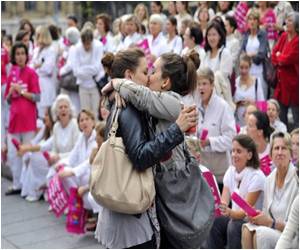Love came first, followed by the baby and now, after a decade together, the long-awaited chance to tie the knot has come for same-sex couple Rene Watkins and Lauren Debelius.

"It's fantastic. We're going to be married soon," said Watkins, 28, as she baked a cake with two-year-old Lillian in the house they share with Debelius, 30, in a Baltimore suburb.
"We're planning to marry," Watkins added. "It's important to us and our family. The protection (that same-sex couples acquire) by being married is extremely beneficial for us."
Gay rights groups see marriage equality as the next frontier in the struggle for civil rights.
Later this week the US Supreme Court is expected to decide whether to take up the constitutionality of the Defense of Marriage Act, which defines marriage for the purposes of federal law as a union between a man and a woman only.
Enacted under former president Bill Clinton, DOMA effectively denies same-sex couples the same rights -- from income tax breaks to Social Security benefits -- that heterosexual married couples take for granted.
Advertisement
With marriage equality taking effect in Maryland from January 1, the couple is taking the future of their child -- born to Watkins following artificial insemination involving an anonymous donor -- to heart.
Advertisement
"Under the new law, after January 1, if we have a new child, Lauren won't have to adopt ... We'll be able to put Lauren's name on birth certificate," Watkins added.
That said, Debelius noted how the rights of married same-sex couples can disappear at the state line.
"If we go on vacation -- my mum lives in Pennsylvania -- and Rene has to be rushed into an ER (hospital emergency ward), in the eyes of Pennsylvania state law, I am not her wife," she explained.
That means she would not entitled to the same visitation rights as any other family member, Debelius said, adding: "In Maryland, it wouldn't be questioned."
That's a legal conundrum shared with the estimated 130,000 gay and lesbian couples in the states where marriage equality is either already legal or soon to be legal: Maryland, Maine, Washington, Connecticut, Iowa, Massachusetts, New Hampshire, Vermont and New York, plus the national capital Washington DC.
For that reason, Watkins and Debelius are eager to see the Supreme Court take up the issue. "To have it (marriage equality) nationwide would mean a lot for gay and lesbian couples," Debelius said.
"We have friends that live in Wisconsin," Watkins added. "They are faced with pain and they don't have protections. It's not the same environment... Maryland is pretty progressive."
"People are usually like, 'Oh, Lillian has two mummies' and then they are like, 'Oh, that's cool,' said Tabatha Kamman, a mother of a two-year-old boy and a straight friend of Watkins and Debelius.
"And then that's pretty much the end of the conversation."
"They are a very typical family, no different than my husband and I," added another friend and young mother, Mia Capen. "They want the same things that we want... to have a wonderful life and everything for their child."
Source-AFP









